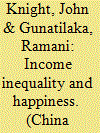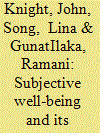| Srl | Item |
| 1 |
ID:
187843


|
|
|
|
|
| Summary/Abstract |
The effect of inequality on happiness should intrigue social scientists. Of the many dimensions of income inequality, we explore four, analysing a rich data set for China. Does actual or perceived inequality have a greater effect on happiness? We find that perceptions of inequality are the more important. How broad is the reference group with which people compare themselves? They report that it is narrow; and indeed narrowly defined inequality has the greater effect on happiness. Do perceptions of the degree of fairness of inequality matter? They do, as they ameliorate the adverse effect of inequality on happiness, especially for the poorest. Is it self-centred or community-based inequality which affects happiness? Both measures have significant effects, but in opposite directions. The research and policy implications are discussed.
|
|
|
|
|
|
|
|
|
|
|
|
|
|
|
|
| 2 |
ID:
092530


|
|
|
|
|
| Publication |
2009.
|
| Summary/Abstract |
A national household survey for 2002, containing a specially designed module on subjective well-being, is used to estimate pioneering happiness functions in rural China. The variables that are predicted by economic theory to be important for happiness prove to be relatively unimportant. Our analysis suggests that we need to draw on psychology and sociology if we are to understand. Rural China is not a hotbed of dissatisfaction with life, possibly because most people are found to confine their reference groups to the village. Relative income within the village and relative income over time, both in the past and expected in the future, are shown to be important for current happiness, whereas current income is less so. Even amidst the poverty of rural China, attitudes, social comparisons and aspirations influence subjective well-being. The implications of the findings for the future and for policy are considered.
|
|
|
|
|
|
|
|
|
|
|
|
|
|
|
|